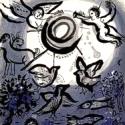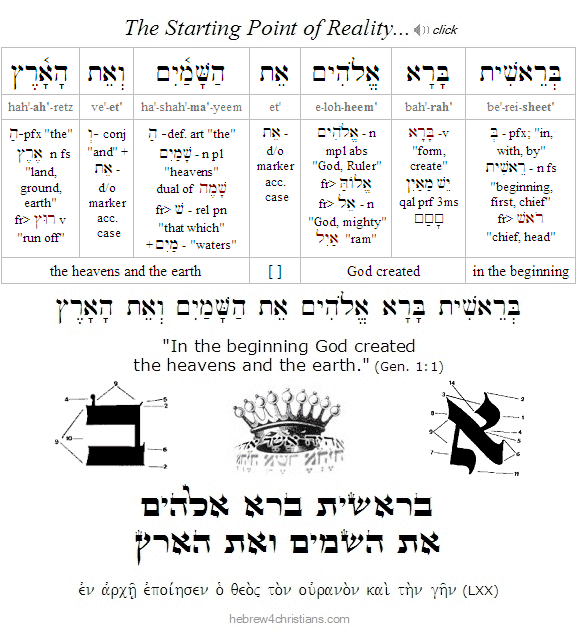|
|
|||||||||||||||||||||
 |
|||||||||||||||||||||
|
Learn Hebrew |
|||||||||||||||||||||
|
|
||||||||||||||||||||||||||||
|
While the Torah gives two different accounts of creation, it is important to understand that these are not contradictory narratives but are intended to overlap one another. The first account of creation (Gen. 1:1-2:3) is general and cosmological, describing the "six days of creation" (and a seventh day of rest), whereas the second account (Gen. 2:4-25) elaborates upon the general statement given earlier that man was made b'tzelem Elohim, "in the image of God," on the sixth day (Gen. 1:26-27). In other words, Genesis 1 describes the general structure of the six days of creation, whereas Genesis 2 provides clarifying details regarding the creation of man on the sixth day.
The first account of creation begins with the opening verse of the Bible itself: ūæų╝ų░ū©ųĄūÉū®ūüų┤ūÖū¬ ūæų╝ųĖū©ųĖūÉ ūÉų▒ū£ūöų┤ūÖūØ be┬Ęre┬Ęsheet bah┬Ęrah e┬Ęloh┬Ęheem "In the beginning God created
ūÉųĄū£ų╝ųČūö ū¬ūĢų╣ū£ų░ūōūĢų╣ū¬ ūöųĘū®ų╝ūüųĖū×ųĘūÖų┤ūØ ūĢų░ūöųĖūÉųĖū©ųČūź ūæų╝ų░ūöų┤ūæų╝ųĖū©ų░ūÉųĖūØ e┬Ęleh tohl┬Ędoht ha┬Ęshah┬Ęma┬Ęyeem ve┬Ęhah┬Ęah┬Ęretz be┬Ęhee┬Ębahr┬Ęahm "These are the generations of the heavens and the earth when they were created, Notice that the word "toldot" (ū¬ūĢų╣ū£ų░ūōūĢų╣ū¬) used in Gen. 2:4 (usually translated as "generations" or "history") is spelled with an additional letter Vav (ūĢ), the only occurrence of this spelling in the Torah, which therefore signals something unusual about this passage. Furthermore, the word translated "when they were created" (ūæų╝ų░ūöų┤ūæų╝ųĖū©ų░ūÉųĖūØ) is written with a smaller letter Hey (ūö), suggesting that God created the world as easily as breathing out an "h" sound. Note that this word can also be rearranged to spell the name "in Abraham" (ūæų╝ų░ūÉų┤ūæų░ū©ųĖūöųĖūØ), which has led some of the early commentators to remark that the universe was created for the sake of Abraham and his descendants (Rom. 4:13). |
|
|
||||||||||||||||||||||||||
|
|
|
|
Hebrew for Christians |
|||||||
|
|||||||





